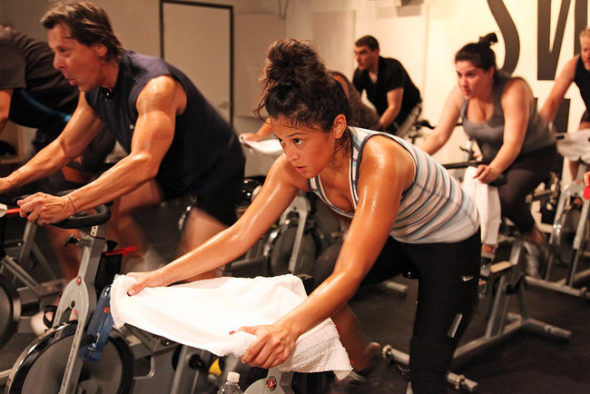How to Wash Your Gym Clothes: It’s More Than Just Soap and Water
Over 58,000,000 people a year head to fitness clubs in the USA, according to statisticbrain.com— that’s a lot of stretchy pants, sports bras, body-hugging jackets, and sweat-wicking tops. With all the new sweat-repelling and anti-stink technology in athletic wear, and athleisure becoming an average everyday fashion choice, it’s important to know how to properly care for these investment pieces, and one of the biggest issues fitness-lovers face is getting the rancid stink of sweat out of their favorite clothes.
“The bad smell in workout wear doesn’t come from sweat, but from the bacteria on your skin that break down sweat,” explains Taylor Nations, Chemist, Earth Friendly Products. “That’s why unwashed workout clothes smell worse over time—bacteria replicate, and more sweat is broken down into odorous compounds. Lingering odors in washed workout wear can be caused by synthetic fibers that are designed to be moisture-resistant. They’re great when you’re working up a sweat because they help keep you dry, but the water and detergent in your washer have a hard time penetrating these water-resistant fabrics.”
READ MORE: This is the world’s fittest grandma
Why do synthetic materials trap stinky odors so much more than natural ones? Mary Johnson, Fabric Care Principal Scientist for Tide and Downy, explains that it boils down to the way the fabrics are constructed, “Most performance fabrics are made of synthetic fibers, which attract and hold odors because they contain many moisture channels. They’re actually like odor magnets!” We’ve all been hanging around in tree pose trying to become channels for meditative success while the reality is we’re just channels for bacteria. Great. “While these fibers are beneficial because they allow moisture to pass through, they also creates a lot of nooks and crannies for dirt and odor molecules to settle in and hide leading to malodor. That said, you need to make sure you have a laundry detergent that deep cleans and can totally eliminate the dirt and odors instead of just masking them.”
Some clean-conscious companies are doing exactly that— creating special detergent formulas designed to not only clean the dirty grime off our fabrics, but to get deep into those ‘moisture channels’ to eliminate odor and stinky bacteria. These detergents go to work even after the anti-microbial properties in some high-end workout wear stop working. The little known secret that nobody seems to talk about is that the fabrics containing pre-seeding anti-microbial agents tend to wash away over time, and if you’re hitting the gym every day in one of just a few pairs of pants, you’ll likely have little to no anti-microbial benefits left by the end of a couple months (assuming you’re washing your gear regularly).
Mary Johnson and her team are behind the Febreze-for-workout-clothes revolution happening on store shelves, and there’s real science behind it. “Odor defense technology prevents smells from coming back by breaking down the organic compounds and body soils that sit deep down at the very core of the fabric, which can build up and lead to odors.” It’s not just a marketing gimmick— because Johnson’s team found that a whopping 70% of laundry soils are actually invisible, leading to a lot of stink-causing bacteria we can’t even see. Many people aren’t washing their clothes until they see visible signs of dirt, but the human body produces about 1 liter of sweat each day, providing more than enough grime to go around your favorite yoga pants. People are also washing far less than they used to, allowing more time for those stinky bacteria to replicate and stink up a storm.
“Washing machines are 40% larger today than they were 10 years ago, and on average, loads contain 45% more dirt than they used to. This means people are doing larger loads, less often—so dirty laundry is sitting around longer, allowing odors to grow and transfer between garments. If you’re a gym rat, you definitely need to make sure you’re doing laundry regularly versus letting your sweaty clothes sit in the hamper for a long period of time. Also, let your gym clothes dry completely before putting them in the hamper. To protect the stretch in your workout gear, wash in cold water with a detergent like Tide PODS plus Febreze Odor Defense that removes odor causing body soils in cold water and tumble dry on low or air dry.”
How to wash gym clothes to effectively keep the stink at bay:
Always air dry your workout clothes before throwing them in a hamper. “After a hard workout, hang up your clothes immediately or wash them as soon as possible. Throwing soiled clothes in the bottom of a hamper gives the bacteria more time and a great environment in which to grow,” shares Nations.
Inside out is best. “Once you’re ready to wash, turn your clothes inside out. Most of the sweat and oils are inside the garment, and turning it inside out will increase your detergent’s effectiveness by giving it better access to these soils.”
Aways use cold water. “Using warm or hot water will damage your workout gear and wash away any antimicrobial coatings that may be present.”
More isn’t necessarily better. “Don’t use too much detergent; manufacturer-recommended dosage levels are chosen carefully for optimum effectiveness. Too much detergent will not rinse out properly and will result in buildup, further decreasing the ability of water to penetrate your clothing in future washes. Fabric softeners and dryer sheets can also result in buildup, so it’s best to avoid them to keep your clothes as clean and odorless as possible.”
Old fashioned air-drying is actually the best. “Once you’re done washing, air drying is your best bet for odor-free clothing. You can also dry clothes on low heat if air drying is not an option, but high heat will lock in any residual odors.”
Habit changer: Forget what you’ve heard about using baking soda in your wash to eliminate odors — that’s just not how to wash gym clothes effectively. If you’re the natural type, try adding a cup of white vinegar to the rinse cycle of your wash to breakdown bacteria and any remaining soils.










